Robert hooke 1665 - Study guides, Class notes & Summaries
Looking for the best study guides, study notes and summaries about Robert hooke 1665? On this page you'll find 89 study documents about Robert hooke 1665.
Page 2 out of 89 results
Sort by
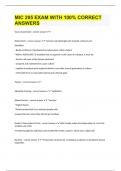
-
MIC 205 EXAM WITH 100% CORRECT ANSWERS
- Exam (elaborations) • 14 pages • 2024
-
- $11.99
- + learn more
Van Leeuwenhoek - correct answer - Robert Koch - correct answer *German microbiologist who isolated, cultured and identified: - Bacillus anthracis, Mycobacterium tuberculosis, Vibrio cholera *KOCH'S POSTULATE: To establish that an organism is the cause of a disease, it must be: - found in all cases of the disease examined - prepared and maintained in a pure culture - capable of producing the original infection, even after several generations in culture - retrievable from an inoculated...
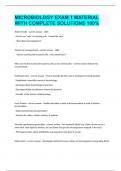
-
MICROBIOLOGY EXAM 1 MATERIAL WITH COMPLETE SOLUTIONS 100%
- Exam (elaborations) • 22 pages • 2023
- Available in package deal
-
- $12.99
- + learn more
MICROBIOLOGY EXAM 1 MATERIAL WITH COMPLETE SOLUTIONS 100% Robert Hooke - correct answer . 1665 . First to see "cells" on viewing cork, *coined the term* . *Described microorganisms* Antoni Von Leeuwenhoek - correct answer . 1684 . *First to see/describe bacterial cells, "wee animalcules"* Who was the first to describe bacteria cells as wee animalcules? - correct answer Antoni Von Leeuwenhoek Ferdinand Cohn - correct answer . First to describe the life cycle of endospore-formin...
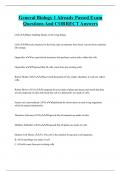
-
General Biology 1 Already Passed Exam Questions And CORRECT Answers
- Exam (elaborations) • 8 pages • 2024
-
- $7.99
- + learn more
Cells Basic building blocks of all living things. Cells Provide structure for the body, take in nutrients from food, convert those nutrients into energy. Organelles are specialized structures that perform certain tasks within the cells Organelles Proposed that all cells come from pre-existing cells. Robert Hooke (1665) Discovered thousands of tiny empty chambers in cork are called cells.
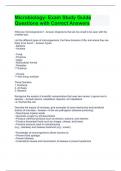
-
Microbiology- Exam Study Guide Questions with Correct Answers
- Exam (elaborations) • 14 pages • 2024
- Available in package deal
-
- $14.49
- + learn more
Microbiology- Exam Study Guide Questions with Correct Answers Give examples of ancient microbiology. - Answer-• Yogurt (~8,000 BC) • Early EgypJans made beer, wine, and bread • Mosaic Law: eschewing pork and seafood • Varro 120 BC: "small tiny animals, which cannot be seen with the naked eye, grow in moist places, these are carried with the air through the nose and mouth into the body and bring severe illness" • Black Death (1348 onwards) killed 30-60% of Europe Cells, ...
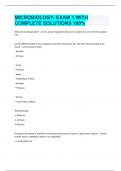
-
MICROBIOLOGY- EXAM 1 WITH COMPLETE SOLUTIONS 100%
- Exam (elaborations) • 21 pages • 2023
- Available in package deal
-
- $13.49
- + learn more
MICROBIOLOGY- EXAM 1 WITH COMPLETE SOLUTIONS 100% What are microorganisms? - correct answer Organisms that are too small to be seen with the unaided eye. List the different types of microorganisms, the three domains of life, and where they are likely to be found. - correct answer Types: - Bacteria - Archaea - Fungi - Protozoa - Algae - Multicellular Animal - Parasites ^^ Eukarya - Viruses ^^ Non-living, acellular Three Domains: 1. Eurkarya, 2. Archaea, 3. Bacteria ...
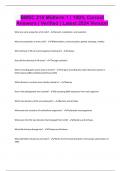
-
BMSC 210 Midterm 1 | 100% Correct Answers | Verified | Latest 2024 Version
- Exam (elaborations) • 25 pages • 2024
-
Available in package deal
-
- $10.10
- + learn more
BMSC 210 Midterm 1 | 100% Correct Answers | Verified | Latest 2024 Version What are some properties of all cells? - Growth, metabolism, and evolution What are properties of some cells? - differentiation, communication, genetic exchange, motility What domain of life do marcroorganisms belong to? - Eukarya How did the diversity of life arise? - Through evolution Which encoding gene was/is slow to evolve? - The gene encoding the small ribosomal subunit in both eukarya (18S) and Bacte...
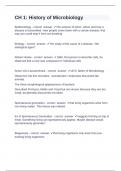
-
CH 1: History of Microbiology Question and answers verified to pass
- Exam (elaborations) • 5 pages • 2024
-
Available in package deal
-
- $12.99
- + learn more
CH 1: History of Microbiology Question and answers verified to pass Epidemiology - correct answer The science of when, where and how a disease is transmitted. How people come down with a certain disease, that way you could stop it from out breaking Etiology - correct answer The study of the cause of a disease, "the etiological agent" Robert Hooke - correct answer 1665, first person to describe cells, he observed that a cork was composed of "individual cells Anton Van Leeuwenhoe...
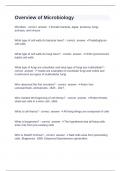
-
Overview of Microbiology Questions with complete solution
- Exam (elaborations) • 5 pages • 2024
-
Available in package deal
-
- $12.99
- + learn more
Overview of Microbiology Questions with complete solution Microbes - correct answer Include bacteria, algae, protozoa, fungi, archaea, and virsues What type of cell walls do bacteria have? - correct answer Peptidoglycan cell walls What type of cell walls do fungi have? - correct answer Chitin (pronounced kaitin) cell walls What type of fungi are unicellular and what type of fungi are multicellular? - correct answer Yeasts are examples of unicellular fungi and molds and mushroom...
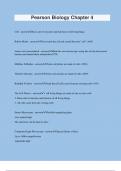
-
Pearson Biology Chapter 4
- Exam (elaborations) • 5 pages • 2024
-
- $10.49
- + learn more
Pearson Biology Chapter 4 Cell - answerBasic unit of structure and function of all living things Robert Hooke - answerDiscovered the cell and coined the term "cell" (1665) Anton van Leeuwenhoek - answerMade his own microscope, using this tool he discovered bacteria and named them animalcules(1974) Matthias Schleiden - answerNotices all plants are made of cells (1838) Theodor Schwann - answerNotices all animals are made of cells (1839) Rudolph Virchow - answerFound that all cells come fr...
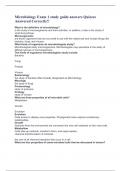
-
Microbiology Exam 1 study guide answers Quizzes Answered Correctly!!
- Exam (elaborations) • 13 pages • 2024
-
- $14.49
- + learn more
Microbiology Exam 1 study guide answers Quizzes Answered Correctly!! What is the definition of microbiology? is the study of microorganisms and their activities. In addition, it also is the study of small living things. Microorganisms are those organisms that are too small to see with the naked eye and include things like bacteria, fungi, and viruses. What kinds of organisms do microbiologists study? Microbiologists study microorganisms. Microbiologists may specialize in the study of dif...

Do you wonder why so many students wear nice clothes, have money to spare and enjoy tons of free time? Well, they sell on Stuvia! Imagine your study notes being downloaded a dozen times for $15 each. Every. Single. Day. Discover all about earning on Stuvia


